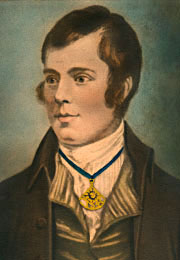
|
| 
| |
|
Burns has described this as an old song and tune which had often thrilled through his soul; and in communicating it to his friend George Thomson, he professed to have recovered it from an old man’s singing; and exclaimed regarding it--"Light be the turf on the breast of the Heaven-inspired poet who composed this glorious fragment!" The probability is, however, that the poet was indulging in a little mystification on the subject, and that the entire song was his own composition. The second and third verses--describing the happy days of youth--are his beyond a doubt.
|
|
SHOULD auld acquaintance be forgot, |
|
And never brought to min'? |
|
Should auld acquaintance be forgot, |
|
And days o' lang syne? |
| |
CHORUS |
|
For auld lang syne, my dear, |
| |
For auld lang syne, |
|
We'll tak a cup o' kindness yet |
| |
For auld lang syne ! |
|
We twa hae run about the braes, |
|
And put't the gowans fine ; |
|
But we've wander'd mony a weary foot |
|
Sin' auld lang syne ! |
| |
For auld &c. |
|
We twa hae paidlet i' the burn, |
|
Frae mornin sun till dine : |
|
But seas between us braid hae roar'd |
|
Sin' auld lang syne. |
| |
For auld &c. |
|
And here’s a hand, my trusty fiere,1. |
|
And gie’s a hand o' thine ; |
|
And we'll tak a right gude willie-waught,2. |
|
For auld lang syne ! |
| |
For auld &c. |
|
And surely ye'll be your pint-stowp, |
|
And surely I'll be mine ; |
|
And we'll tak a cup o' kindness yet, |
|
For auld lang syne. |
| |
For auld &c.
|
|
Notes transcribed from The Complete Works of Robert Burns. William P. Nimmo, Edinburgh: 1867. p. 130. Footnotes renumbered. Text transcribed from The Works of Robert Burns, with an account of his life, and a criticism on his writings. To which are prefixed, some observations on the character and condition of the Scottish peasantry. In four volumes. Vol. II. The Second Edition. London: Printed for T. Cadell, Jun. and W. Davies, Strand; and W. Creech, Edinburgh. 1801. Printed by R. Noble in the Old Bailey [467 pages] p.122-3.
|
|